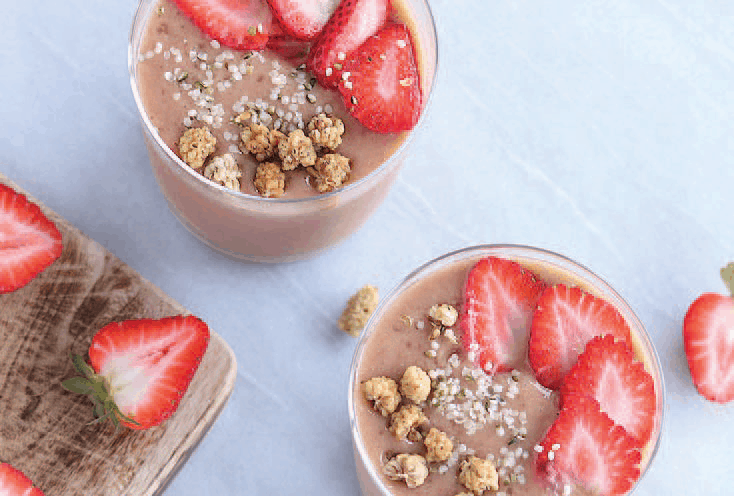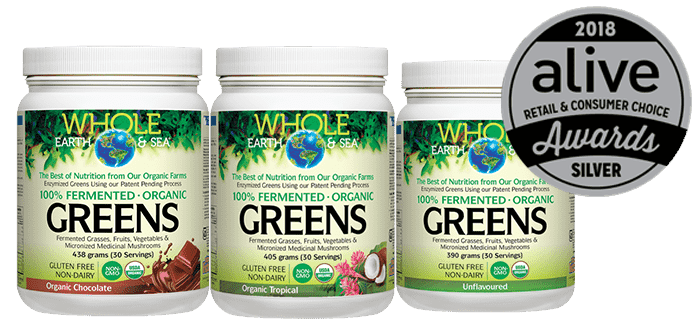Your Guide to Protein, Fermentation & Greens
If you’re trying to build muscle, stick to a plant-based diet, or simply meet your daily nutritional needs, you might find yourself asking, “but where do I get my protein?” Fermented protein powders offer a concentrated source of amino acids to help you meet your daily protein needs, while fermented greens supplements are a rich source of beneficial phytonutrients. The drawback is, most formulas are either organic or fermented, but not both.
At Whole Earth & Sea, we believe that you shouldn’t have to choose between the two, which is why our product Protein & Greens is 100% organic and fermented! In this Essential Guide to Protein, Greens, and Fermentation, you’ll learn why protein is essential for great health, how much protein you need each day, and why fermented protein and greens can help you live your best life!
Table of Contents
Protein
Whole Earth & Sea Cookbook
Try these protein-packed recipes including delicious smoothies, gnocchi, veggie burgers, banana bread, and more!
What is Protein?
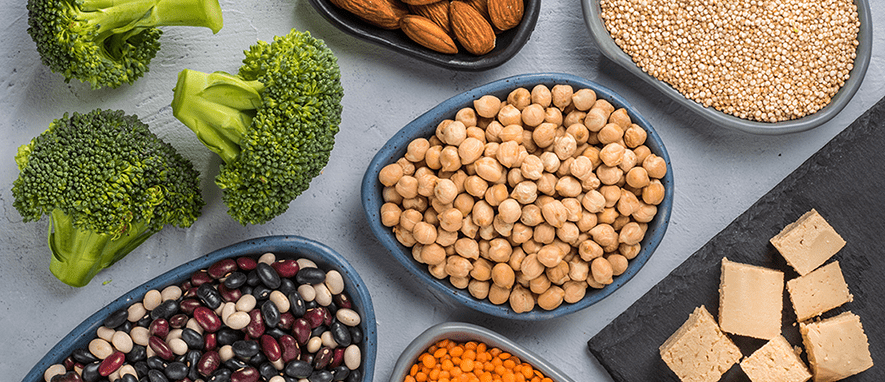
Protein is a macronutrient that is essential to human health and nutrition.
Within a protein, amino acids are linked together to form chains, some of which can be produced by the body itself while others are available through nutrition (the latter are called essential amino acids, or EAAs).
Protein plays a variety of roles in the body, including forming the bulk of muscle tissue, skin, hair, and nails. Amino acids and proteins also form an important part of enzymes, including digestive enzymes as well as the ones involved in energy production, along with cell receptors, immune system cells, hormones, and neurotransmitters.
Best Sources of Plant Protein
The proteins in our bodies closely match those found in other animals – containing the full spectrum of essential amino acids – which is why animal-derived proteins are often referred to as “complete”. Some plant proteins, such as quinoa, pea, and hemp, are also complete, while others are missing at least one EAA, making them “incomplete”. The good news is that your body can easily combine all the amino acids found in plant foods such as grains, beans, nuts, and seeds to create its own complete protein!
| Plant Foods | Protein (per 100 g) |
|---|---|
| Amaranth | 3.8 g (cooked) |
| Hemp seeds | 36.7 g (shelled) |
| Long grain brown rice | 2.6 g (cooked) |
| Peas | 5 g |
| Quinoa | 4.4 g (cooked) |
How Much Protein Do You Need Each Day?
Most people should aim to consume around 0.8 g of protein per kilogram of body weight each day. Because it can be a little harder to extract amino acids from plant proteins, people who eat a predominantly plant-based diet might want to try an intake of around 0.9 g per kilogram of body weight.
For example, someone who is moderately active and weighs approximately 68 kg (150 lb) would want to consume around 54–62 g of protein per day to maintain a healthy body weight. Someone similar who weighs 90 kg (200 lb) would want to plan an intake of around 72–81 g of protein per day.
Inadequate protein intake is more likely to occur in people who eat a plant-based diet, especially if it is low in calories, raw, fruitarian, lacking legumes, or largely based on junk food. Too little protein can lead to loss of muscle mass, slow growth and healing, lower immunity, and poor bone health. Most people who eat a meat-heavy diet consume too much protein, though. This can create an acidic environment in the body, which may compromise bone health.
Plant-based protein does not have this acidifying effect, and plant foods are also usually lower in saturated fat, as well as being cholesterol free!
To find out more about how much protein you need each day, choose from the options below. For each goal, you’ll find customized information to meet your needs.
Healthy Weight Management
- To maintain a healthy body weight, try to get around 20% of your calories from protein.
- On a 2000 kcal/day diet, this means around 400 calories from protein, or 100 g (every gram of protein provides 4 kcal of energy).
- For a 2500 kcal/day diet, have a target of 500 kcal from protein, or 125 g of protein per day.
- You can achieve this by eating protein-rich foods at every meal and as snacks. For convenience, and taste, use 100% Fermented Organic Protein & Greens to make a delicious breakfast smoothie that provides 21 g of plant-based protein!
Weight Loss
- Research shows that for some people a diet that provides 25% of calories from protein can help promote healthy, sustainable weight loss better than a diet providing just 15% of calories from protein.
- In practice, this means that a diet providing 1800 calories per day would include 450 calories from protein, working out to around 112 g of protein per day.
- While a diet providing 2000 calories per day would include 125 g of protein.
Muscle Building
- To support muscle building and repair, you’ll need a higher overall protein intake than the average person.
- Aim for around 1.4–1.8 g of protein per kg of body weight if you’re trying to build muscle, choosing the higher amount if you’re eating predominantly plant proteins.
- In practice, this means that someone weighing 68 kg (150 lb) would want to consume around 95–122 g of protein per day to build muscle and stay healthy.
- Someone similar who weighs 90 kg (200 lb) would want to achieve an intake of around 108–126 g of protein per day.
Endurance
- Intense physical activity, such as endurance training, dramatically increases the breakdown of protein during and after exercise.
- The longer and more intense the exercise, the more protein is broken down and used for fuel. Therefore to support muscle repair and growth, as well as all the other activities for which we need protein, endurance athletes require a higher overall protein intake than the average person.
- Aim for around 1.2–1.4 g of protein per kg of body weight if you’re engaged in endurance training, choosing the higher amount if eating predominantly plant proteins.
- In practice, a 68 kg (150 lb) endurance athlete would want to consume around 82–95 g of protein per day to maintain a healthy body weight.
- Someone similar who weighs 90 kg (200 lb) would want to target an intake of around 126–162 g of protein per day.
Strong Seniors
- Older adults tend to eat less and to process protein less efficiently. This means that it’s smart for seniors to pay attention to protein-rich foods, especially when eating a predominantly plant-based diet.
- Protein needs may increase by as much as 25–50% in some older adults. This means that someone aged 75 and who weighs 68 kg (150 lb) would want to achieve a protein intake of 67–93 g of protein per day.
- Protein supplements providing complete plant-protein can be particularly helpful for seniors who may struggle to consume enough food to meet requirements for protein and other nutrients.
- Higher protein diets in combination with resistance training have been shown to help slow the typical loss of muscle mass that occurs with age. A good protein intake is also important for maintaining bone health, immune function, digestion, healing, and mood, all of which can become issues in our later years.
- To meet increased protein needs in older age, seniors often find it best to have a larger protein shake at breakfast and a smaller protein shake about an hour before bedtime. This helps provide energy during the day and can also help promote healthy sleep at night.
Pregnancy and Nursing
- As the saying goes, if you’re pregnant, you’re eating for two! While you don’t quite need to double your calorie intake when pregnant or nursing, you might well need to increase your protein intake by 50% to help your baby grow and to maintain your own health and muscle mass.
- Plan on increasing your protein intake by about 25 g in the second trimester, with around 15–20 g of protein at each meal.
- Aim to eat 5–6 servings of protein-rich foods daily and include protein-rich snacks to help you meet your daily protein needs.
Is Dietary Protein Enough?
A balanced, varied, and healthy diet can absolutely provide enough protein for some people to maintain optimal health while for others, it can be hard to meet protein needs through diet alone.
Could you benefit from a protein supplement?
Your protein requirements may be higher or harder to meet if you have digestive or malabsorption issues and/or are:
- More active than the average person
- Over the age of 50
- Pregnant or nursing
- Trying to lose weight
- Trying to build muscle
- Eating a predominantly plant-based diet
If any of these things apply, a high-quality protein powder can help boost your protein intake.
Protein Shakes vs Protein Food: Necessity or Trend?
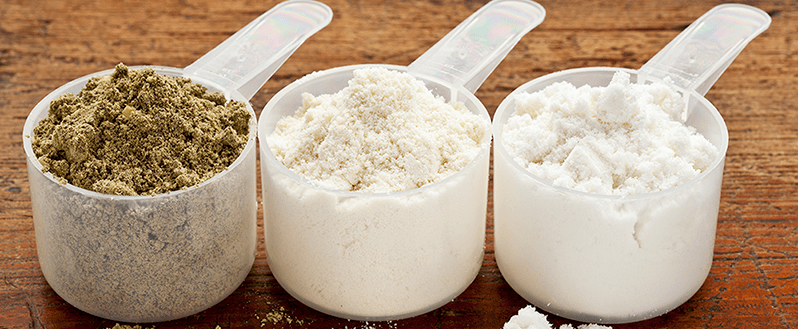
The amino acids in a protein powder tend to enter the bloodstream, and reach your muscles and other tissues a lot faster than protein bound in food. Protein powder offers a convenient way to get protein quickly and without the need to perform complex calculations when deciding what to eat for dinner. Quick to mix into a shake or food, every scoop of Protein & Greens provides 21 g of high-quality vegan-friendly complete protein. There’s no need to think about limiting amino acids or mixing legumes and grains because this 100% organic and fermented plant protein does all the hard work for you!
Top 12 Protein Powder FAQs
What types of protein are there and what are they good for?
- Protein isolate is mainly amino acids with nothing else added. It is digested slowly, is usually less allergenic than other types of protein, and can help you feel fuller for longer.
- Protein hydrolysate is digested faster because the amino acid bonds have been broken by enzymatic activity. This type of protein is particularly good for supporting muscle recovery as the amino acids are more rapidly incorporated into skeletal muscle. Concentrated protein is less processed than other forms, but is still high in protein and is a good option for anyone wanting a more natural protein powder.
- Fermented protein is a naturally concentrated source of amino acids as the process of fermentation helps get rid of excess carbohydrates. Fermentation makes the amino acids in plant proteins easier for the body to absorb and use, and can also help remove antinutrients while producing unique antioxidant flavonoid compounds!
What’s the best protein powder to gain muscle mass?
Protein & Greens provides a high-quality source of plant protein thanks to the natural process of fermentation which removes excess carbohydrate to concentrate amino acids. This type of protein provides easily absorbed amino acids that are quickly incorporated into skeletal muscle to help repair, recovery, and muscle growth.
What’s the best protein powder for weight loss?
Opt for a high-quality fermented protein powder that provides a concentrated source of amino acids, ideally as part of a low-carbohydrate and low-fat plant-based formula that also provides some fibre and a wealth of nutrients to support good health. Aim to get 25% of your daily calories from protein to help maintain muscle mass, encourage fat burning, and satisfy your appetite so you can avoid the temptation of unhealthy snacks.
How many protein shakes can I have per day?
Whole Earth and Sea 100% Fermented Organic Protein & Greens suggested serving is 1 scoop (35.5 g) added to water or juice and shake or blend until smooth.
Should I drink protein shakes before or after workout?
If you’re trying to lose weight, however, you might want to have a protein shake 45 minutes before your workout. This can promote thermogenesis and fat burning, while helping you maintain muscle mass as you work towards your target weight.
What should I eat immediately after a workout or training session?
Mixing Protein & Greens with fruit juice or a non-dairy milk alternative is a great way to get the protein and carbohydrate you need, alongside a bounty of beneficial nutrients from fermented superfood greens and medicinal mushrooms.
What’s the difference between plant proteins, whey, and casein?
Plant protein is not only good for human health, it’s also better for the planet. Every gram of milk protein requires around 1.5 times the amount of water than the equivalent protein from pulses, substantially involves the use of pesticides, herbicides, and other chemicals, and results in a significantly greater output of greenhouse gases that contribute to climate change.
Should I take protein powder with water or milk?
Protein & Greens can easily be mixed with any non-carbonated beverage, as well as into food, and can even be used when baking and cooking! Many people enjoy drinking it mixed with almond milk or other non-dairy milk alternatives. Bear in mind that mixing protein powder with milk or juice will add calories.
Will protein powder cause constipation, bloating, and gas?
Fermented plant proteins are essentially “pre-digested”, meaning that they are easier on the digestive system.
Are there any side effects to protein powders?
Protein itself, however, can slow down the entry of glucose into the blood. As such, it is important for anyone with prediabetes or diabetes to monitor their blood glucose when increasing their protein intake as this may affect their insulin requirements. A high intake of protein is not recommended for individuals with liver or kidney problems.
Will protein powder make me break out?
Protein & Greens provides 100% plant-based protein that is easily absorbed, free of anything artificial, and packed with nutrients to support glucose metabolism, hormone health, and skin health.
Do plant proteins contain complete amino acids?
Protein & Greens includes quinoa, pea, hemp, rice, and amaranth to provide 21 g of complete plant protein in every scoop!
The Benefits of Fermented Protein
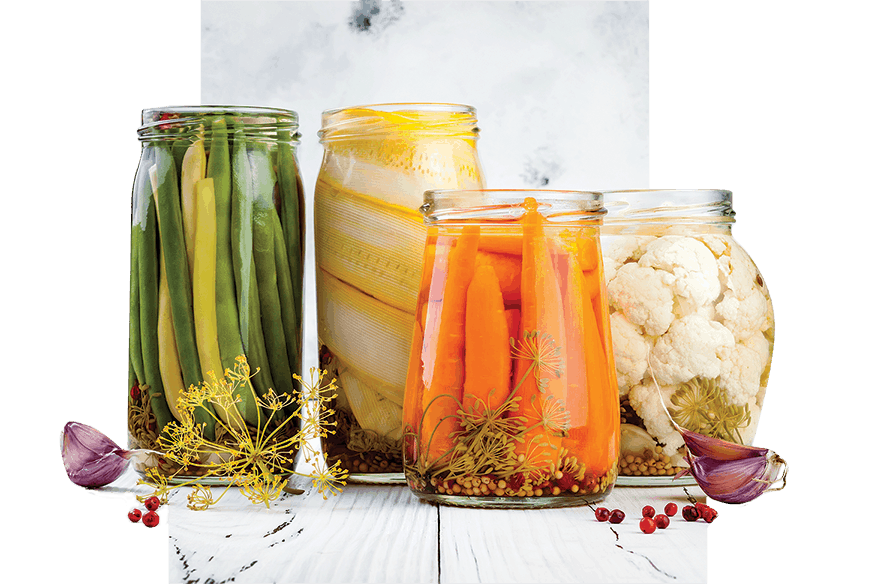
Protein & Greens from Whole Earth & Sea provides 100% fermented protein. Why does this matter?
Well, for one, fermentation helps enhance protein quality by removing excess carbohydrates and concentrating amino acids. Fermentation also helps neutralize antinutrients such as phytates that can limit the absorption of vitamins and minerals, and it can even produce unique antioxidant flavonoids to help protect against free radicals!
High-Protein Powders You’ll Love!
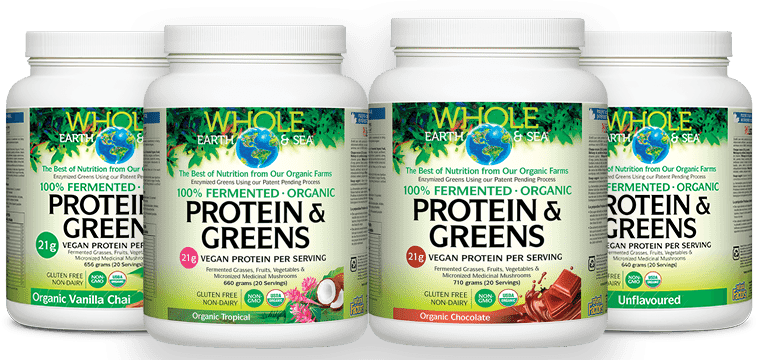
Whole Earth & Sea Protein & Greens are 100% fermented and certified organic formulas designed to invigorate, nourish, and support an active, healthy, and sustainable lifestyle.
Each serving of these exceptional non-GMO, vegan-friendly green superfood formulas are packed with:
- Fermented organic superfood greens – to support an alkaline environment in the body
- Fermented organic whole foods such as dandelion, cilantro, carrot, kale, and beets – providing a broad spectrum of phytonutrients
- A blend of cordyceps, reishi, mimematsutake, shiitake, maitake, and turkey tail mushrooms – rich in polysacchardides
- 21 g of the cleanest plant-based protein available in the Protein & Greens
- Whole Earth & Sea Protein & Greens are non-GMO, gluten free, dairy free, contain no artificial colours, sweeteners or preservatives, and are naturally sweetened.
The Health Benefits of Fermentation
Why fermentation? Fermentation releases a plant’s full nutritional potential. The process of food fermentation for preservation is an ancient practice. More recently, scientific studies have revealed the many nutritional benefits of fermentation:
Releases the plant’s full nutrient power, as well as produces unique metabolites, for deep nourishment
Eliminates antinutrients, such as phylates, which inhibit the absorption of iron, zinc, and other minerals
Improves gut health by promoting the growth of beneficial bacteria, improving digestion, and strengthening your gut barrier
Reduces gas and bloating by predigesting complex foods
Enhances protein quality and absorption by up to 40%!
The Benefits of Greens
Why you need more greens in your diet
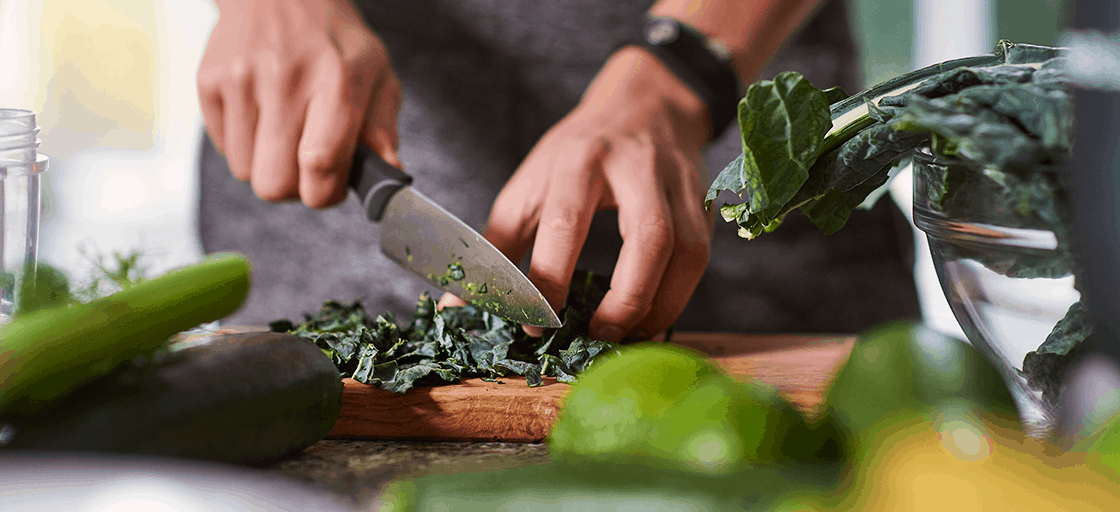
Fermented superfood greens delivers a concentrated, easily absorbed source of beneficial phytonutrients and antioxidants to help:
- Support an alkaline environment in the body
- Provide a rich source of vitamin C to protect against the damaging effects of free radicals
- Support energy metabolism
- Promote normal immune function
- Optimize overall health and well-being
The Best Way to Get More Greens in your Diet
100% Fermented Organic Greens, made in Canada. Getting more greens in your diet has never been easier, thanks to Whole Earth & Sea Greens. This formula is designed to invigorate, nourish, and support an active, healthy, and sustainable lifestyle. Some features of this exceptional non-GMO, vegan-friendly green superfood formula:
- The ONLY 100% organic fermented greens formula
- Includes over 28 grasses, fruits and vegetables, most of which are grown on Factors Farms
- Each one-scoop serving is the equivalent of 8 servings of fruits and vegetables
- Available in delicious organic chocolate and tropical flavours, and unflavoured
- Vegan friendly, non-GMO, gluten free, and dairy free
- Naturally sweetened and contains no artificial colours, sweeteners, or preservatives
- Bottles are made of 100% post-consumer recycled materials and are completely recyclable and BPA free
- Third-party certified by ISURA֯® to ensure purity and potency
- Fermented organic whole foods such as dandelion, cilantro, carrot, kale, and beets – providing a broad spectrum of phytonutrients
- A blend of cordyceps, reishi, himematsutake, shiitake, maitake, and turkey tail mushrooms – rich in polysaccharides – to support immune function
- 6 g of high-quality naturally concentrated, 100% fermented and organic plant-based protein in Greens
I LOVE this product! I’m a CNP and PT and recommend this and greens to clients! Plant based equals alkaline! Coconut flavor is awesome! It mixes well, not chalky at all! Great for protein balls with coconut oil and almond butter!! LOVE LOVE it on every level holistically!
I LOVE the medicinal mushroom blend, the powder itself mixes much better into a smoothie, rather than on its own! I would recommend the tropical flavour for anyone looking to up their nutrient intake!
Love it! The chocolate flavour is awesome, blends well and just sweet enough. Really happy to see the fermented mushroom blend included. Great formulation!
Being a vegan I really wanted to try the greens and proteins but they were all out, the greens fermented was very good. I like the fact it is fermented for optimal gut health. I am not big on added flavours so I think I would purchase the unflavored next time.
Pods Embed Error: WHERE contains SQL that is not allowed.
.png)
